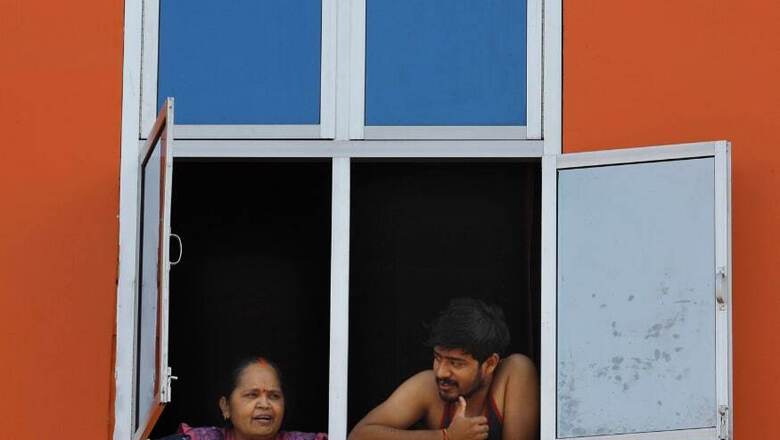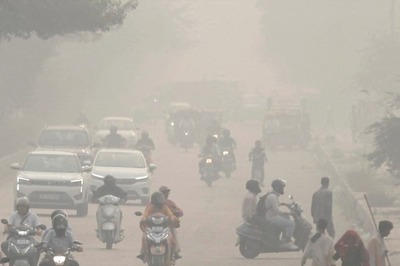
views
On a regular day, Durga Vaidyanathan wakes up at 6am, finishes her morning routine and goes for a walk in the park right outside her home. She is 31 and fighting the Weaver- Williams syndrome, with moderate mental retardation. But Durga is fairly independent. She enjoys shopping. She can go to the store nearby with no help. By 9am 0n weekdays, she’s off to PAPCP, or Parents Association of Persons with Celebral Palsy and Associated Disorders, a day-care centre in Bengaluru where she is with her friends and teachers until 3pm. There was a rhythm. Since March, she has not had any of it. She is confined to her home. It is sometimes heavy on her, says her parent.
“These children are used to touch, feel and sound. Now all their social interaction is taken away. We have used Skype and other sessions with her. We try to address it through technology but still we can’t bridge that gap. And in her category we don’t want her to be anywhere near the virus. We are overprotective too about her not going out. We have restricted her physically and emotionally. She interacts a lot with her friends too. When we interact with her we tend to stress her a bit. We expect her to be proper. Whereas she’s more forgiven with others, say her friends. We can see internally that stress is built up. We are trying to defuse it but it will take a while till she goes back to her routine,” says Vaidyanathan LK, her father.
Durga was routinely engaged in work during their time at the centre with her classmates making paper bags, candles, paintings or data entry jobs for which she and the others here are paid a stipend. Back home, she is involved in some activities but it isn’t as structured as it would be at the organisation. Vaidyanathan is unsure how she would react once she steps out again when the world is not fully out of the pandemic.
“We make her watch television every day, make her understand news, ask her to paraphrase the news and put a few lines. We ask her to write what’s Covid, what’s virus. We tell her she has to wash hands when she enters her home from outside. But this in a controlled environment. We don’t know how she is going to react once she steps outside after these many days. Also, there is this independence we built in her. To regain it, it would take some time. Making her wear a mask, not touch her face would be difficult. We also forget sometimes and we touch our faces involuntarily and then realise. That realisation may not happen with her,” adds Vaidyanathan.
Durga’s friend and classmate Swathika is fully occupied with dance, music, yoga lessons online. She’s glued to the phone or laptop and is attempting to learn what the teacher is teaching her. She is an adult with cerebral palsy and fighting mental retardation.
“My computer teacher came on the small screen (phone). Then music teacher came on the large screen (laptop). I enjoyed the bigger screen. Now yoga is also happening. Please call me on my number,” says Swathika over the phone of her father as she slowly tells her personal mobile number.
64-year-old Swaminathan, her father, is a single parent ever since her mother died 22 years ago. His parents took care of her until they died in 2012-13. Since then, he has been working from home.
“Sometimes she gets irritated because I might be getting multiple calls, mails after mails. But she’s mostly busy speaking to her aunts, nieces and nephews. She maintains personal hygiene, is independent and is organised,” says Swaminathan.
From the balcony of her home, Swathika sees police patrolling the streets, making announcements about Covid-19. She has her understanding of the lockdown and even tells her father to wear a mask. She also lit a lamp and applauded the ‘corona warriors’ in March and April.
The centre which was temporarily shut on March 11 has 44 students, some with cerebral palsy, others with intellectual disability, mental retardation or Down’s syndrome.
“Each one has reacted to the sudden shutdown differently. We should be able to open the centre now for at least some students who need to come in. Some enjoy the time with family, some do not have the cognitive ability to fully understand the shutdown,” says PAPCP secretary KMS Pradeep, also parent of a special child.
“The children here are all young adults. Mostly averaging age of 30. Like all other citizens, they are all frustrated. At the centre there was physiotherapy, music therapy, movement therapy, none of which is available to them now. Some parents are trying out things on Zoom. Things like physiotherapy. In my case, my son has at least five family members around and he knows since everybody is home something is going on,” says another parent of a special child who did not wish to be named.
13-year-old Ranjan* was not convinced at all when he was told about the lockdown. His mother Rajitha* showed the police outside, tried explaining, but Ranjan, who is fighting intellectual disability, would not be convinced. He was then taken around the town, shown his regular chocolate and ice cream stores shut. Ranjan was still unsure why he couldn’t travel around which he loved doing during breaks from school. He was then taken to a cop nearby.
“I requested the policeman to explain it to him. He explained to my son that there is a virus which we might contract, it is dangerous and we must all stay indoors. Since then he has not thrown tantrums. Now I give him some activities at home. I label vegetables, fruits and utensils and ask him to get something or I teach him how to grate a carrot with a good grip, how to operate the washing machine, a mixer and how to arrange things inside a refrigerator,” says Rajitha, who’s also a special educator.
Some others like Nikhil V needed none of these. He has been comfortable at home, happy with family. Nikhil is 21 years old and is fighting severe mental retardation, speech and hearing impairment.
“His strength is his vision although he cannot focus on online classes throughout. We make him walk in the house. He enjoys being at home. He’s playing by himself, comes and sits with us sometimes or roams around the house. He is comfortable also because he is not forced to do any activity. But he has tactile issues. He won’t allow you to touch his face or head. He will not wear a mask so we have to be extremely careful to ensure he or any of us don’t fall sick. If he does, we cannot take him to a hospital. Him falling sick would be a big worry. So, in a way, staying at home is a big boon,” says Priya Vinay, Nikhil’s mother.
Many parents are now trained professionals who teach at day-care centres along with supporting their children. In addition, the centres coordinate with parents using technology explaining the activity that needs to be done.
“The coping strategies of the individuals with different/special needs don’t really have to be based on their conditions, but yes their qualities do influence their way of understanding and responding to this situation. Having said that, for adults and children with different functionalities/abilities, who are used to and comfortable in their regime or structured routine like any of us, they need to adapt to any change or shift in the structure or conditioning. Here it is a challenge to adapt to that change because they can get triggered due to the sudden and discomforting changes. The family members will have to support them and settle them to this new regime or environment,” says Janavi Ananth, a counseling psychologist based in Bengaluru.
Asha KS, a Bengaluru-based educationist had enrolled her sister Sharadha to a short-stay home in the city. In the midst of her 18-month-long course, she was taken home during the lockdown. All those residing at the centre with a family were temporarily sent home to avoid infection. Sharadha is 48 and fighting schizophrenia. Since its first attack when she was 20 years old, she has had multiple relapses. Asha had survived breast cancer and is fighting its relapse which occurred in 2018 with regular treatment. Their 76-year-old father had a heart attack less than a year ago.
“It is stressful. You have to constantly monitor her. Every three days or so, she would have an attack where she would get violent, aggressive, harm herself. She also has visual and auditory hallucinations. She may not eat or sleep on time, walks up and down; she is exhausted and she is confined to her room or the hall in the house. There is absolutely no social interaction. She understands we are stressed too so even that takes a toll on her,” says Asha, an educationist.
Asha says the bigger challenge is to fight the stigma against a person with mental health concerns within and outside the family to an extent where institutional care is also not seen as acceptable.
“Family situation may not be conducive sometimes for recovery of patients. This is the longest period some of them have been away, beyond six weeks. It has its own difficulty and complications. There are concerns about interaction with family members which could cause relapse. For example, if family members have issues with client not waking up on time, client is repeatedly told what to do, criticising them, negative remarks made, criticism, which brings a hostile situation, negative communication, overindulgence, overinvolvement could all be contributing factors,” says Latha Hemchand, clinical psychologist at the Richmond Fellowship Society which runs the short-stay home.
The society, an NGO, also runs a long-stay home where people with family back home have been living for 18 to 25 years. Here, too, some fight anxiety issues during the pandemic. One could be triggered by seeing someone bring vegetables from outside, fearing it carries the virus.
“Among those in the short-stay home, we have seen mild relapse in three or four cases. It is not necessarily related to the Covid situation. They sometimes have relapse, due to various factors. Now, they are all confined to the same building, not allowed to go out of the main building. There is lack of socialisation in those recovering. It can be a reason for some of them. We try to talk to them, modify medication before it gets out of hand. We do get feedback from some of them saying they are not doing well. Missing medication could be a major cause of relapse and each time a relapse occurs it affects the brain. Medication for mental health is not taken seriously by many like in the case of physical health issue like diabetes or blood pressure. It is taken for granted which is dangerous,” says Dr Kalyanasundaram, CEO of the Richmond Fellowship Society in Bengaluru.
Its day-care centre has been temporarily shut like many others across the country. Some are preparing to reopen with lockdown restrictions being slowly lifted. But a bigger challenge lies ahead for many. All this while, they have fought to learn and live the way considered normal by society. And now, there is a new normal.
(*name changed to protect identity)
This reporting was supported by the ESSENCE Media fellowship for sensitive reporting on mental health.
Read all the Latest News, Breaking News and Coronavirus News here

















Comments
0 comment